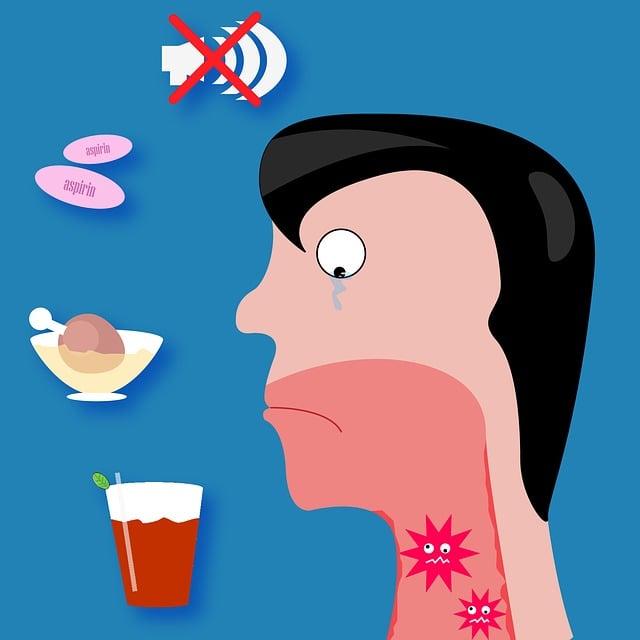Metrogyl for Throat Infection: Effective Cure for Sore Throats
Are you tired of feeling like a throat-sore monster straight out of a horror movie? Does your voice resemble that of a croaky frog that just lost a sing-off? Fear not! In this article, we’ll explore the miraculous powers of Metrogyl, which could be your ticket to banishing those pesky sore throats once and for all. With its reputation as an effective cure for throat infections, this medication might just be the trusty sidekick you need in your battle against discomfort. So, grab a lozenge, sit back, and let’s dive into how Metrogyl could help you reclaim your voice—and your social life!
Page Contents
- Understanding Throat Infections and Their Symptoms
- The Role of Metrogyl in Treating Throat Infections
- How Metrogyl Works Against Bacterial Infections
- Dosage Guidelines for Safe and Effective Use
- Potential Side Effects and Precautions to Consider
- Why Consulting a Healthcare Professional is Crucial
- Complementary Home Remedies for Sore Throat Relief
- When to Seek Further Medical Attention for Throat Issues
- Frequently Asked Questions
- Final Thoughts
- Accidentally Took Double Dose of Trileptal? The Hidden Dangers
- Zofran for Itching: Does It Really Work?
- Gabantin 300 Side Effects: Are You at Risk?
- Rivaroxaban Versus Apixaban: The Ultimate Comparison
- Heparin vs Rivaroxaban: Which Is More Effective?
- Zofran Lawsuit Settlement Amounts: What to Expect
Understanding Throat Infections and Their Symptoms
Throat infections can range from mild discomfort to severe pain, often causing significant disruption to daily activities. Common causes of these infections include **viral** and **bacterial agents**, with symptoms that can vary widely depending on the underlying cause. Recognizing early signs is crucial for effective treatment and can help prevent further complications.
Typical symptoms to watch for include:
- Sore throat: Often described as a scratchy or burning sensation, pain may worsen with swallowing.
- Swollen glands: Tenderness in the neck can indicate infection, as lymph nodes react to pathogens.
- Difficulties swallowing: Inflammation may lead to discomfort or pain while eating or drinking.
- Fever and chills: Elevated body temperature may accompany infections, serving as a body’s defense mechanism.
- Hoarseness or loss of voice: The vocal cords can be affected, leading to changes in the sound of your voice.
Further evaluation may require testing to determine the cause of the infection, which can guide appropriate treatment options. For bacterial infections, antibiotics may be prescribed, while viral infections often require supportive care. Understanding the symptoms can play a vital role in ensuring timely and effective treatment.
The Role of Metrogyl in Treating Throat Infections
Metrogyl, a brand name for metronidazole, is increasingly recognized for its effectiveness in treating throat infections, particularly those caused by anaerobic bacteria. Oral infections, as well as certain enduring throat conditions, can often stem from a mix of bacterial activity, where Metrogyl serves as a potent ally in combating these pathogens. Its mechanism of action involves disrupting the DNA synthesis in bacteria, leading to the effective eradication of the infections.
When considering the application of Metrogyl in throat infections, various factors come into play:
- Broad Spectrum Activity: Metrogyl is known for its effectiveness against a wide range of anaerobic organisms that may contribute to throat infections.
- Anti-inflammatory Properties: It may also reduce inflammation in the throat, offering symptomatic relief in conjunction with its antibacterial action.
- Combination Therapy: Often used alongside other antibiotics, it provides a more comprehensive treatment approach, especially in severe cases.
Furthermore, it’s crucial to follow a proper dosage schedule when using Metrogyl for throat infections, as improper use may lead to resistance or insufficient treatment outcomes. Dosages typically range based on the severity and nature of the infection, thus consulting a healthcare provider is essential to determine the right course. Here’s a brief overview of standard dosing guidelines:
| Severity of Infection | Dosage | Duration |
|---|---|---|
| Mild | 500 mg twice daily | 5-7 days |
| Moderate | 750 mg twice daily | 7-10 days |
| Severe | 1,000 mg three times daily | 10-14 days |
How Metrogyl Works Against Bacterial Infections
Metrogyl, a well-known antimicrobial agent, works primarily through its active ingredient, metronidazole, which targets bacterial infections effectively. When introduced into the body, Metrogyl interferes with the DNA synthesis of susceptible bacteria, effectively halting their growth and reproduction. This mechanism is particularly beneficial in treating throat infections, where bacteria can disrupt normal function and lead to significant discomfort.
Its effectiveness is largely attributed to its ability to:
- Disrupt Bacterial Metabolism: Metronidazole actively penetrates bacterial cells and disrupts their metabolic processes, leading to cell death.
- Target Anaerobic Bacteria: This medication is particularly adept at combating anaerobic bacteria, which thrive in low-oxygen environments, such as infections in the throat.
- Reduce Inflammation: By controlling bacterial growth, Metrogyl also indirectly helps in reducing inflammation, alleviating soreness, and speeding up recovery.
It’s important to note that while Metrogyl is effective for bacterial infections, it should be used under the guidance of a healthcare professional to ensure proper diagnosis and treatment. The ideal dosage and duration of treatment can vary, emphasizing the need for a personalized approach based on the severity of the infection and the patient’s overall health. A typical course for a throat infection may involve:
| Dosage | Duration | Frequency |
|---|---|---|
| 500 mg | 7-10 days | Two to three times daily |

Dosage Guidelines for Safe and Effective Use
To ensure the safe and effective use of Metrogyl for throat infections, it is crucial to adhere to recommended dosage guidelines. The dosage may vary based on individual needs, and it is essential to consult with a healthcare professional for personalized recommendations. However, general indications are as follows:
- Adults: Typically, the standard dose is 250 mg to 750 mg taken two to three times daily.
- Children: Dosage for children is based on body weight and medical condition; a common range is 7.5 mg/kg/day, divided into smaller doses.
- Duration: Treatment usually lasts between 5 to 10 days, depending on the severity of the infection.
It’s essential to take Metrogyl with food to minimize gastrointestinal discomfort and enhance absorption. Additionally, maintain consistent intervals between doses to ensure optimal effectiveness and minimize the risk of missed doses. Always consult with a healthcare provider if you experience any side effects or if symptoms persist beyond the recommended duration.
| Patient Group | Standard Dosage | Frequency |
|---|---|---|
| Adults | 250 mg to 750 mg | 2-3 times daily |
| Children | 7.5 mg/kg/day | Divided doses |

Potential Side Effects and Precautions to Consider
While Metrogyl can be an effective treatment for throat infections, it is important to be aware of potential side effects and the precautions associated with its use. Like any medication, it may not be suitable for everyone, and understanding these factors is essential for safe usage.
Common side effects can include:
- Nausea – Some individuals may experience gastrointestinal discomfort.
- Headache – A frequent complaint among users.
- Dry mouth – May occur and can be managed with hydration.
- Allergic reactions – In rare cases, rashes or swelling may be observed.
Precautions to consider include:
- Pregnancy and Breastfeeding: Consult with your healthcare provider before use.
- Liver or Kidney Problems: Monitor renal or hepatic function closely.
- Drug Interactions: Always inform your doctor about other medications you are taking.
It’s also wise to undergo proper medical consultations to tailor the usage according to your health status. If you experience severe side effects or signs of an allergic reaction, seek medical attention immediately. Maintaining an open dialogue with your healthcare professional can ensure the best outcome while managing a throat infection.

Why Consulting a Healthcare Professional is Crucial
When facing a throat infection, it’s tempting to self-diagnose or seek remedies on the internet. However, consulting a healthcare professional is essential for several reasons:
- Accurate Diagnosis: A healthcare professional can evaluate your symptoms and determine whether the throat infection is viral, bacterial, or due to another cause. This ensures you receive the appropriate treatment.
- Personalized Treatment Plans: Every individual responds differently to medications. A doctor can tailor the treatment to suit your specific health condition and needs, which is critical in managing infections effectively.
- Avoiding Complications: Some throat infections can lead to more serious health issues. Early intervention and professional guidance can prevent complications and promote a faster recovery.
Additionally, professionals can provide valuable insights into the use of medications like Metrogyl, particularly how it interacts with other treatments and any potential side effects you should be aware of. This level of oversight ensures your health is managed holistically.

Complementary Home Remedies for Sore Throat Relief
While over-the-counter medications like Metrogyl can provide significant relief for throat infections, there are several home remedies that can complement their effectiveness and soothe a sore throat naturally. These remedies often use ingredients found in your pantry, making them easily accessible and straightforward to implement. Here are some effective options:
- Honey and Warm Water: A classic remedy, mixing honey in warm water not only soothes irritation but also has antibacterial properties that can help fight infections.
- Saltwater Gargle: Dissolving a teaspoon of salt in warm water and gargling several times a day can reduce swelling and kill bacteria.
- Chamomile Tea: Chamomile is known for its anti-inflammatory properties. Drinking chamomile tea can relieve pain and help you relax.
- Ginger Root: Fresh ginger can help alleviate pain due to its anti-inflammatory effects. Slice some fresh ginger and steep it in boiling water for a soothing tea.
- Apple Cider Vinegar: Diluting apple cider vinegar in warm water can help to kill bacteria and balance the pH levels in the throat.
These remedies can be incorporated into your daily routine not only to help ease the discomfort of a sore throat but also to promote overall healing. Remember to stay hydrated and get plenty of rest to support your body’s recovery process.
| Home Remedy | Benefits |
|---|---|
| Honey and Warm Water | Soothes throat; antibacterial |
| Saltwater Gargle | Reduces swelling; kills bacteria |
| Chamomile Tea | Anti-inflammatory; relaxing |
| Ginger Root Tea | Relieves pain; anti-inflammatory |
| Apple Cider Vinegar | Kills bacteria; balances pH |

When to Seek Further Medical Attention for Throat Issues
While many throat issues can be managed at home, there are certain symptoms that warrant further medical attention. If you experience any of the following signs, it’s crucial to consult a healthcare professional:
- Persistent Pain: If your sore throat lasts longer than a week and doesn’t improve with over-the-counter treatments.
- Difficulty Breathing: Struggling to breathe properly or experiencing wheezing can indicate a serious condition.
- High Fever: A temperature above 101°F (38.3°C) accompanied by throat pain could suggest an infection requiring medical intervention.
- Swollen Lymph Nodes: Noticeable swelling in the neck or jaw that is painful to touch.
- Rash: If a rash develops alongside throat symptoms, it may indicate a systemic infection.
Additionally, if you find that swallowing or speaking becomes increasingly difficult, or if you notice blood in your saliva, it’s important to seek medical advice promptly. Throat issues, while often benign, can sometimes signify more severe health concerns that require immediate care. Keeping track of your symptoms and their progression can help your doctor make a more accurate diagnosis.
| Symptom | Action |
|---|---|
| Pain persists beyond 7 days | Seek medical advice |
| Difficulty breathing | Visit an emergency room |
| High fever with throat pain | Consult a healthcare professional |
| Swollen lymph nodes | Schedule a doctor’s appointment |
Frequently Asked Questions
Q&A: Metrogyl for Throat Infection – Effective Cure for Sore Throats
Q1: What is Metrogyl, and what are its main ingredients?
A1: Metrogyl is a medication that typically combines two active ingredients: Metronidazole and Tinidazole. These are antibiotics primarily known for their effectiveness against anaerobic bacterial infections. They are commonly used to treat various conditions, including throat infections caused by susceptible bacteria.
Q2: How does Metrogyl work to treat throat infections?
A2: Metrogyl works by inhibiting the growth of specific types of bacteria that can cause infections in the throat and other parts of the body. The Metronidazole component disrupts the bacterial DNA, leading to their death, while Tinidazole also targets anaerobic bacteria, enhancing the overall antimicrobial effect. This dual action makes it a potent option for treating infections.
Q3: Can Metrogyl be used for all types of sore throats?
A3: Not necessarily. While Metrogyl can be effective for sore throats caused by bacterial infections, it’s not suitable for viral infections, such as those caused by the common cold or flu. It’s essential to have a healthcare professional diagnose the cause of your sore throat before starting any treatment, including Metrogyl.
Q4: How is Metrogyl administered?
A4: Metrogyl is usually available in various forms, including tablets, gels, and oral solutions. The specific administration method will depend on the severity of the infection and the physician’s recommendation. It’s crucial to adhere to the prescribed dosage and duration of treatment to ensure the infection is effectively eradicated.
Q5: Are there any side effects associated with Metrogyl?
A5: Like any medication, Metrogyl may cause side effects, although not everyone experiences them. Common side effects can include nausea, headache, and a metallic taste in the mouth. Serious side effects are rare but can occur, so it’s important to discuss potential risks with your healthcare provider before starting treatment.
Q6: How quickly can one expect relief from a sore throat after starting Metrogyl?
A6: Improvement varies from person to person, but many individuals may begin to feel relief within a few days of starting Metrogyl, assuming it is the appropriate treatment for their condition. It’s vital to complete the full course of medication, even if symptoms improve quickly, to avoid recurrence or resistance.
Q7: Can I take Metrogyl with other medications?
A7: It’s essential to inform your healthcare provider of all medications and supplements you are currently taking. Some drugs can interact with Metrogyl, potentially impacting its effectiveness or increasing the risk of side effects. Always consult your doctor or pharmacist for tailored advice.
Q8: Is there anything I should avoid while taking Metrogyl?
A8: Yes, while taking Metrogyl, it is generally advised to avoid alcohol consumption as it can result in unpleasant reactions, such as nausea and vomiting. Additionally, maintaining a healthy diet and staying hydrated can help support your recovery process.
Q9: When should I consult a healthcare provider about my sore throat?
A9: You should seek medical advice if you have a sore throat lasting more than a week, experience severe pain, difficulty swallowing or breathing, or if you notice any unusual symptoms such as a rash or fever. A healthcare professional can provide a more accurate diagnosis and appropriate treatment options.
Q10: Where can I learn more about Metrogyl and its uses?
A10: For more information, you can consult your healthcare provider, visit reputable medical websites, or read the package insert that comes with the medication. It’s important to equip yourself with knowledge for a well-informed treatment journey. Remember, your health is paramount, so don’t hesitate to ask questions!
Final Thoughts
Metrogyl stands out as a potent remedy for throat infections, offering relief from the discomfort of sore throats while targeting the underlying causes effectively. Its dual-action formula not only combats bacterial growth but also helps to alleviate the painful symptoms that often accompany throat infections. However, it’s always essential to consult with your healthcare provider before starting any new treatment to ensure it’s the right choice for your unique situation. Remember, taking proactive steps in managing your throat health can lead to quicker recovery and a faster return to your daily activities. Stay informed, stay healthy, and don’t let a sore throat keep you down!


